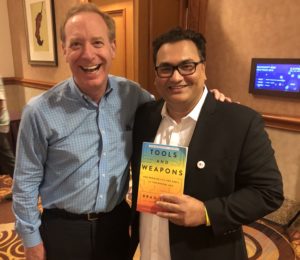
Brad Smith is Microsoft’s President and Chief Legal Officer—and, as it turns out, he is also a powerful storyteller.
Though Smith has written widely in the past on a range of tech topics, this fall he and co-author Carol Ann Browne (a Microsoft communications executive) published their first book, Tools and Weapons: The Promise and the Peril of the Digital Age. This book couldn’t’ve come out at a better time—given the growing role and scrutiny of technology across the world.
Tackling the Biggest Tech Issues
Smith ranges widely across the fundamental tech issues of the day—many that we see discussed in the halls of government with increasing urgency. He dives into surveillance, digital privacy, cybersecurity, AI, facial recognition, and more.
While Smith highlights Microsoft’s positions and policy initiatives, he frequently underscores that Microsoft does not have all of the answers, nor should it. Smith justly argues that in democratic countries, elected officials representing the citizenry should be setting policies, not unelected company officials.
Still, tech businesses have special expertise and need to be part of informed discussions about public policies. Microsoft itself has developed cybersecurity principles, for example, that could serve as a model for legislation in the U.S. and globally.
On other issues, as Smith explains, the company combines marketplace engagement with policy advocacy to help spread the benefits of technology. For instance, as Voices for Innovation advocates know, Microsoft is investing in rural broadband through its Airband Initiative while supporting critically needed policy changes that will provide regulatory certainty.
Anchoring Policy Positions with Human Stories
Too often, discussions of public policy can quickly become abstract, technical, and even dull. Smith avoids this trap by telling stories about people who are impacted by tech policies—and people who are shaking up the tech policy arena.
When discussing broadband access, for example, he takes readers to the Knotty Pine Restaurant and Lodge in rural Ferry County, Washington, to hear from locals. The town’s mayor—a former logger—threatens to show up in sweatpants. He tells Smith that, “‘Almost no one around here has broadband… Promises have been make for years, but nothing’s been done.’”
Smith also shares stories of tech policy crusaders such as Max Schrems, who almost single-handedly effected policy changes to strengthen privacy protections for data transfers between the U.S. and the European Union. Today’s EU-U.S. Privacy Shield, which replaced the International Safe Harbor Principles, is the result of Schrems’ advocacy.
Smith also has a flair for scene setting. He opens the book with a dramatic description of Microsoft’s data center in Quincy, Washington. We enter the center’s highly electrified inner sanctum through bulletproof doors, fireproof walls, and metal detectors. Server racks “extend beyond your line of sight. This massive library of steel and circuits… is the digital world’s filing cabinet.”
Big Ideas for Change
Smith offers insights, raises questions, and makes policy proposals as he proceeds through his key tech topics. In addition to offering concrete approaches to specific issues, Smith also calls for broader changes in how tech companies and policymakers approach regulation. He argues that because data and tech services reach across borders, national governments must work together to find shared solutions and harmonize policies.
Smith also draws on tech operations to raise a provocative idea to help break policy gridlock in Washington, DC. He notes that tech often operates by launching a “minimum viable product.” You launch one version of a product with the expectation that fixes and upgrades will follow. Similarly, he proposes that government move more quickly to keep up with tech but take more limited regulatory steps. Once a base-level policy is established, it can be updated and refined. “[B]y bringing some of the cultural norms developed in the tech sector into the regulation of technology itself, governments can do more to catch up with the pace of technological change.”
This may be wishful thinking, but Smith makes a strong case that government needs to innovate too to make a more positive and practical impact on our lives.
***
Titu Sarder is an American entrepreneur, inventor, investor, and philanthropist who is President and CEO of LLTV, a creative tech media company and leading provider of online tech education content for consumers, businesses, and government. He is a board member of several state and education associations, including the Coalition of New York State Career Schools, Trusted Learning Network, and Florida Association of Veterans Education Specialists (FAVES). Titu is a member of VFI’s Advisory Task Force and president of the New York City Chapter of the International Association of Microsoft Channel Partners (IAMCP).

